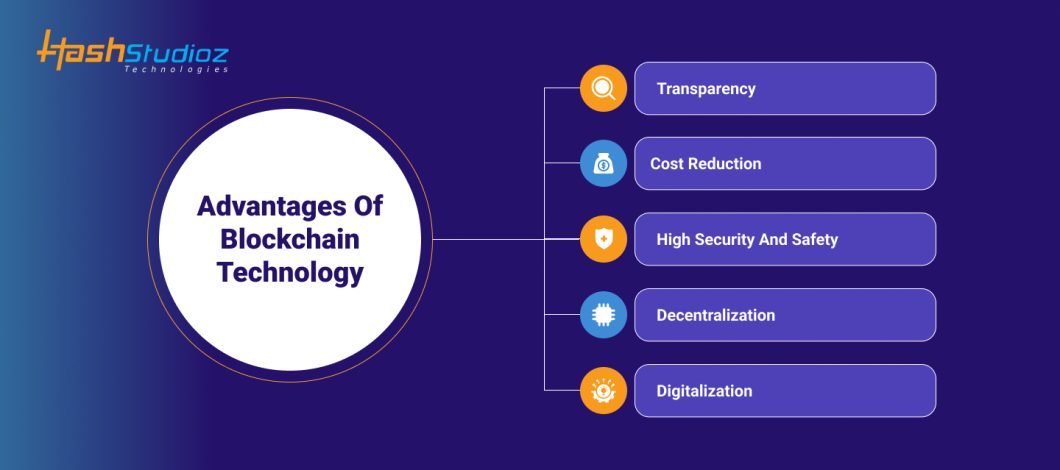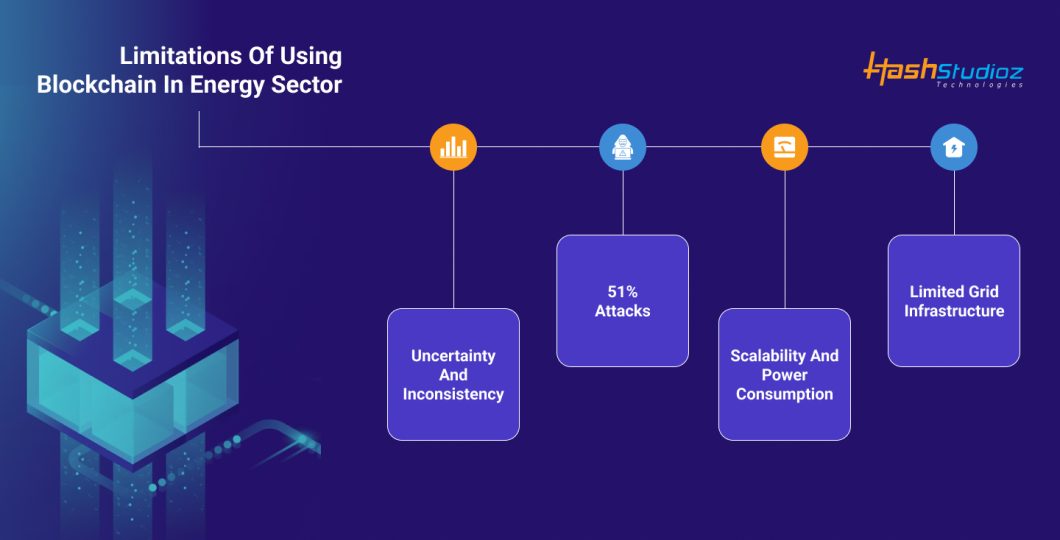Blockchain technology could be transforming the energy industry by offering peer-to-peer energy trading, smart contracts, secure data management, decentralized grids, and tamper-proof certificates. Reducing energy costs, improving energy efficiency, and enabling businesses to achieve their sustainability goals, will create a more efficient, resilient, and sustainable energy system.
The article explores how blockchain is being used in the energy industry, including its advantages, challenges, and the future of blockchain.
Table of Contents
Advantages of blockchain technology

Transparency
Blockchain in energy is also useful for improving transparency across a network of multiple parties. In a blockchain network, every member has their own copy of the blockchain ledger, allowing all information recorded on the ledger to be verified. Additionally, the blockchain’s immutability ensures that records already stored on the ledger cannot be altered. As a result, regulatory compliance can be improved across the board.
This can be accomplished without companies sacrificing control over sensitive data. In an industry that relies heavily on trade secrets, this is extremely important.
Cost reduction
Networks and supply chain in the energy sector often involve many participants. Production and distribution of oil, for example, involves several stages, including exploration, extraction, refining, transportation, and marketing. Through blockchain technology, various parties involved in these activities can communicate efficiently, speed up processes, and eliminate inefficiencies. An organization can save considerable money through such optimizations.
High security and safety
Blockchain technology is also widely acknowledged for its modern data security. Blockchain technology in the energy market uses incredibly secure blocks to protect data. Every block contains a copy of the document linked to and preserved chronologically in the previous blocks.
Blockchain has become so popular in part because of its ability to track and preserve all transactions. Furthermore, it ensures the technology’s dependability and credibility.
Decentralization
Blockchain technology is decentralized, so peer-to-peer networks powered by it can run without being supervised by a central authority. Furthermore, smart contracts can be used to regulate transactions between network participants programmatically. In addition to revealing the level of security that could be achieved in such systems, it also shows how blockchain can support innovation in the energy sector.
To enable more efficient energy use, blockchain can help accelerate the adoption of smart meters and smart grids. It is also possible to connect end users directly to the grid using technology.
Digitalization
Another interesting feature of blockchain technology, it can digitize physical assets. A blockchain can be used to digitize and store any asset as a token using smart contracts. A new way to trade excess energy, carbon credits, and other commodities may result from this.

How is Blockchain used in the energy sector?
Peer-to-peer energy trading
Blockchain technology has the potential to revolutionize the energy industry when it is applied to peer-to-peer (P2P) energy trading. By bypassing traditional utilities and grid operators, P2P energy trading allows individuals and businesses to buy and sell energy directly. As a result, energy markets can become more efficient and cost-effective, and renewable energy sources can be used more effectively.
The Brooklyn Microgrid is one example of P2P energy trading, in which residents can buy and sell solar-generated electricity using blockchain technology. P2P energy trading could enable distributed energy resources to meet up to 45% of global electricity demand by 2050, according to a study.
Blockchain’s Role in Smart Grid Management
Smart grid management is another way blockchain technology is being used in the energy industry. Smart grids use advanced technologies, such as sensors, control systems, and data analytics, to improve reliability, efficiency, and sustainability.
In a smart grid, blockchain can be used to manage energy and data flows securely and transparently. Blockchain-based smart grids, for example, could monitor and manage energy demand and supply in real time and integrate renewable energy sources.
An example of a blockchain-based smart grid is the Exergy project, which uses blockchain technology to monitor and manage energy demand and supply in real-time. By 2025, the global market for blockchain in the energy sector is expected to reach $1.9 billion.
Carbon credit trading
Blockchain technology is also being used in the energy industry to trade carbon credits. By investing in projects that reduce or remove carbon dioxide from the atmosphere, companies and individuals can offset their greenhouse gas emissions.
Carbon credit trading can be made transparent and secure using blockchain technology. A blockchain-based platform for trading carbon credits could simplify the process of buying, selling, and tracking carbon credits.
As one example, Carbon uses blockchain technology to facilitate the trading of carbon credits transparently and securely.

Limitations of using Blockchain in the Energy Sector
Even though several blockchain initiatives have emerged, energy adoption still faces several challenges, including:
Uncertainty and inconsistency: Blockchain procedures and global regulations have not yet been developed in some regions, such as Japan and Europe, which is one of the key barriers to the adoption of blockchain in the energy sector. Managing a decentralized energy system, regulating electricity tariffs, and resolving disputes and reversals require regulations.
51% attacks: Some blockchains can be disrupted by attackers who control the majority of the network and prevent transactions from being completed. Small networks are particularly vulnerable to this type of attack since it would require enormous computing power to take over 51% of large blockchains.

Scalability and power consumption: Blockchains are typically designed to consume a lot of energy and can take a long time to confirm transactions due to their design. Despite technology’s evolution, improvements are still needed.
Limited grid infrastructure: Energy blockchain requires an interconnected smart grid where new players can participate on existing smart meters to be optimized.
Future of Blockchain in the Energy Industry
Blockchain technology is still in its early stages of development, but it has the potential to transform the energy industry in a number of ways. Here are a few examples:
- New energy markets: Blockchain can enable the creation of new energy markets, such as markets for RECs, carbon credits, and other environmental services. These markets can help to promote the adoption of renewable energy and other sustainable energy practices.
- Empowerment of consumers: Blockchain can empower consumers to take control of their energy usage and make more informed choices about their energy sources. For example, consumers can use blockchain to track their energy usage in real time and buy energy from renewable energy generators.
- Decarbonization of the energy sector: Blockchain can play a key role in the decarbonization of the energy sector by enabling the integration of renewable energy sources and DERs. Blockchain can also be used to create carbon markets and track carbon emissions.
Conclusion
In conclusion, the impact of blockchain technology on the energy sector has been revolutionary. It has paved the way for autonomous and decentralized energy systems, sustainability, and secure tracking of carbon emissions.
There are, however, several challenges, including regulatory barriers, a lack of standardization, and a lack of expertise and knowledge.
Although blockchain has many challenges, introducing it into your company’s system can lead to new prospects and open new horizons. Partnering with a blockchain development company such as HashStudioz can assist you in overcoming challenges and simplifying the development process.
Furthermore, HashStudioz offers a diverse range of blockchain development services to help start-ups, businesses, and enterprises seeking to enhance their operations with more efficient and automated solutions.

FAQs
What are the barriers to the adoption of blockchain in the energy sector?
There are several barriers to the adoption of blockchain in the energy sector, including:
- Lack of awareness: There is still a lack of awareness of blockchain technology among energy sector stakeholders.
- Technical challenges: There are a number of technical challenges that need to be addressed before blockchain can be widely adopted in the energy sector.
- Regulatory uncertainty: There is still a lack of regulatory clarity around blockchain in the energy sector.
What are some specific examples of blockchain being used in the energy sector?
There are many specific examples of blockchain being used in the energy sector, including:
- Power Ledger: Power Ledger is a blockchain-based platform that allows consumers to buy and sell solar energy directly from each other.
- WePower: WePower is a blockchain-based platform that allows consumers to invest in renewable energy projects.
- Grid+: Grid+ is a blockchain-based company that provides demand response services to utilities.
- LO3 Energy: LO3 Energy is a blockchain-based company that develops and deploys peer-to-peer energy trading solutions.
What is the future of blockchain in the energy sector?
The future of blockchain in the energy sector is still uncertain, but there is a lot of potential for this technology to revolutionize the way energy is produced, distributed, and consumed. As the technology matures and the challenges are addressed, blockchain is likely to play an increasingly important role in the energy sector.

